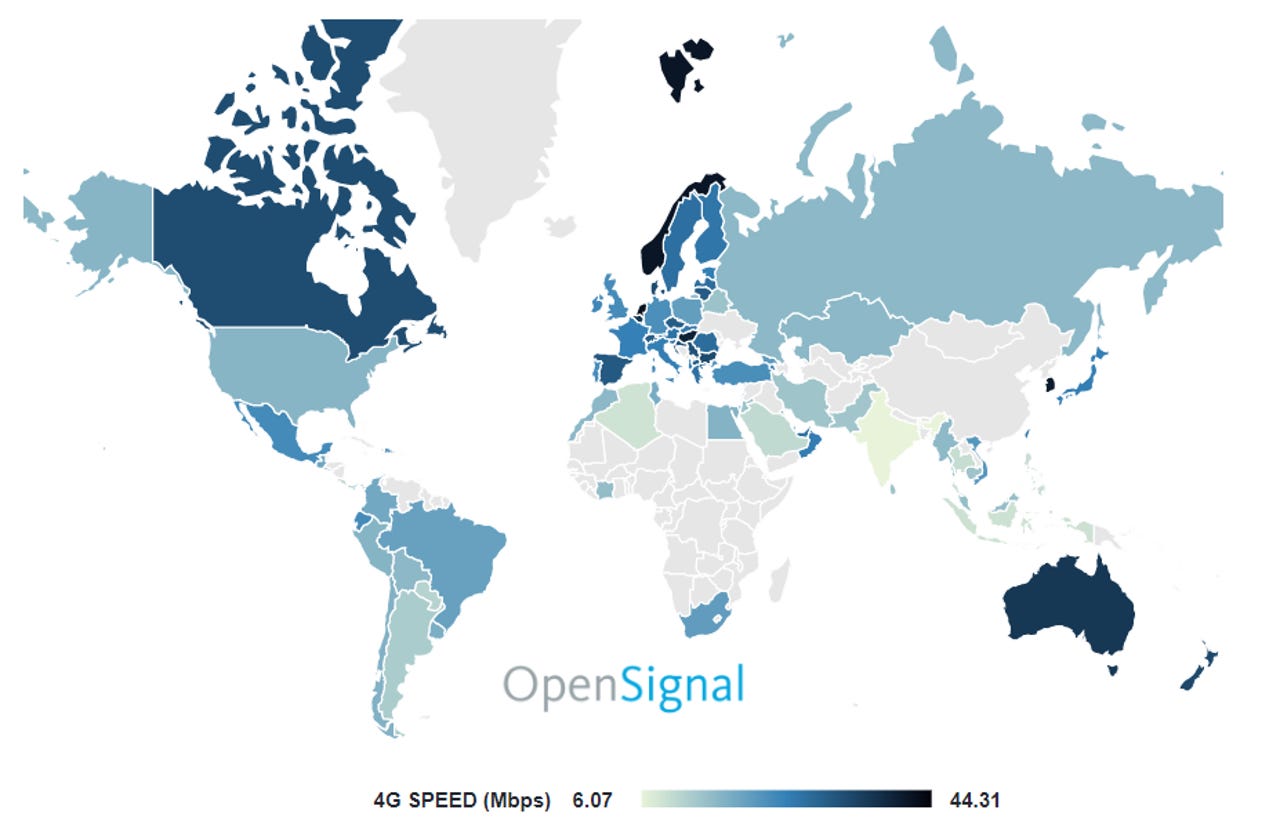Australian 4G climbs global ranks: OpenSignal


Telecommunications coverage mapping company OpenSignal has released its LTE report for the final quarter of 2017, revealing that Australia climbed the ranks across both speeds and availability.
According to the report, Australia rose by three places to rank seventh globally in terms of average download speeds, and rose six places to come 13th worldwide in terms of 4G availability.
Between October and December, Australia's 4G speeds averaged 36.08Mbps, behind Singapore on 44.31Mbps; Netherlands on 42.12Mbps; Norway on 41.20Mbps; South Korea on 40.44Mbps; Hungary on 39.18Mbps; and Belgium on 36.13Mbps.
According to OpenSignal, Australia's improved speeds were due to "big network investments from ... Telstra and Vodafone".
New Zealand followed directly behind Australia, with speeds of 33.52Mbps, while the United States trailed with less than half of these speeds, at just 16.31Mbps on average.
The report added that Australia ranked 13th on availability, with 4G networks available to consumers 86.48 percent of the time, behind South Korea's 97.49 percent; Japan's 94.70 percent; Norway's 92.16 percent; Hong Kong's 90.34 percent; the US' 90.32 percent; Netherlands' 89.64 percent; Hungary's 89.26 percent; Kuwait's 88.40 percent; Lithuania's 88.40 percent; Czech Republic's 87.37 percent; Sweden's 87.31 percent; and Taiwan's 87.08 percent.
New Zealand ranked 65th on availability, at 69.07 percent.
India came just behind Australia in terms of availability, at 86.26 percent, but ranked last on speeds, averaging just 6.07Mbps; while the United Kingdom averaged speeds of 23.11Mbps at availability of 77.28 percent.
An OpenSignal report from November had ranked Australia's three mobile telcos, finding that Telstra has the highest average 4G speeds while Optus has the best 4G latency and Vodafone Australia the highest 4G availability.
Telstra's average 4G download speed between July and September was 37.82Mbps, OpenSignal said, with Vodafone clocking in at 35.21Mbps and Optus following on 30.22Mbps.
Optus led on average 3G speeds, at 6.53Mbps, followed by Vodafone at 6.27Mbps and Telstra at 5.66Mbps.
The overall average download speed for each telco was 30.88Mbps for Telstra, 29.44Mbps for Vodafone, and 24.85Mbps for Optus.
On speeds, OpenSignal pointed towards Telstra aggregating five 4G channels, Optus aggregating between two and four, and Vodafone doing the same though over less spectrum.
Telstra and Optus also use 4x4 Multiple-Input Multiple-Output (4x4 MIMO) and 256 Quadrature Amplitude Moderation (256 QAM), the report said, meaning speeds will climb even higher across Australia once more consumers begin using compatible devices.
Overall, OpenSignal said Australia's mature mobile market is a prime area for moving to 5G as seen in trials by Telstra, Optus, and Vodafone.
"With such a mature and competitive mobile market between three carriers, it's nearly time to look ahead at what's next in Australia. And the operators are doing just that, leading trials of advanced technologies as we transition towards a 5G future," OpenSignal said.
"Regardless of future plans, Australia's mobile broadband market today is already among the best in the world when it comes to 4G. Strong signals abound with download speeds are some of the fastest in the world. If any country is building a testbed for future 5G services, it's Australia."
Related Coverage
Telstra and Ericsson attain 2Gbps 4G speeds
A year after launching gigabit LTE, Telstra and Ericsson have announced attaining 2Gbps speeds across 4G by utilising 4x4 MIMO and 256 QAM, and aggregating 100MHz of spectrum across three frequency bands.
Google's Project Fi expands international coverage to 170 countries
The company's carrier project continues to gain features, the latest of which is better international service and helpful alerts.
Huawei announces 5G trial in Vancouver
Huawei has announced attaining single-user speeds of 2Gbps during trials of 5G customer premises equipment with Telus in Vancouver, using mmWave spectrum, Massive MIMO, F-OFDM, and polar coding.
The $800 Huawei Mate 10 Pro is a solid Android smartphone that's also sleek and stylish (TechRepublic)
The new flagship phone from Huawei is the Mate 10 Pro, and it's a gorgeous device with an excellent Leica dual camera and a fast fingerprint scanner.
US intelligence chiefs say Huawei, ZTE products pose national security risk (TechRepublic)
US intelligence service leaders have repeated claims of Huawei collaborating with the Chinese government since 2012, but have provided no evidence.
Mobile device computing policy (Tech Pro Research)
Mobile devices offer convenience and flexibility for the modern workforce-but they also bring associated risks and support issues. This policy establishes guidelines to help ensure safe and productive mobility.